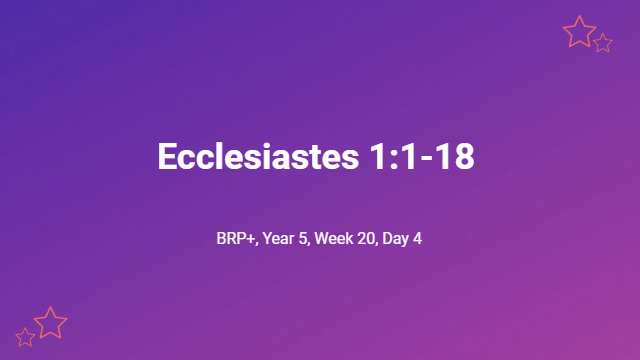Ecclesiastes 1:1-18
Q.1. Why did the Preacher conclude that life is tiresome and pointless? How did he view the past, present, and future? – (Ecc.1:1-11)
Solomon concluded about life that – all is vanity (from Ecc.1:2 to 12:8 it is repeated 30 times). He used the word to describe (i) the fleeting, vapour like, and transitory nature of life. (ii) the futile, meaningless, tiresome, and pointless nature of life. (iii) the puzzling, mysterious, and incomprehensible nature of life. He stated that both life and nature’s cycle are endlessly repetitive. The past is (and will be) forgotten, and the generations come and go (Ecc.1:4-7). All man’s work brings no real advantage or satisfaction, since only – the earth remains forever (Ecc.1:4). No one can claim to be trying something new, for – there is nothing new under the sun (Ecc.1:9 c.f. 1:10).
Q.2. Who was the Preacher? What was his quest in this life? What advantage did he have in the pursuit of his goal? How far was he prepared to go? What did he find? – (Ecc.1:1, 12-18)
The Preacher was Solomon – the son of David, king in Jerusalem (Ecc.1:1). He had huge advantages in his quest to search for the meaning of life – I said to myself, “Behold, I have magnified and increased wisdom more than all who were over Jerusalem before me; and my mind has observed a wealth of wisdom and knowledge.” (Ecc.1:16). In this privileged position, he outlined his thesis – I set my mind to seek and explore by wisdom concerning all that has been done under heaven. It is a grievous task which God has given to the sons of men to be afflicted with (Ecc.1:13). In this pursuit of wisdom he did not deny himself any experience (Ecc.1:17 c.f. Ecc.2:10-11). Yet he concluded- I have seen all the works which have been done under the sun, and behold, all is vanity and striving after wind (Ecc.1:14).

